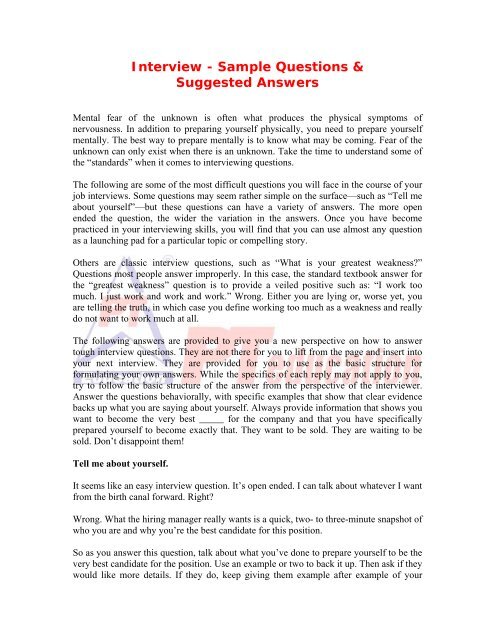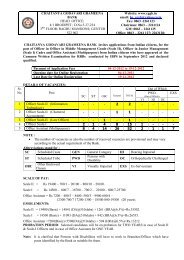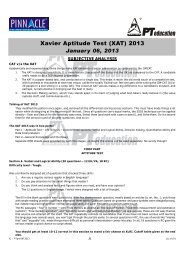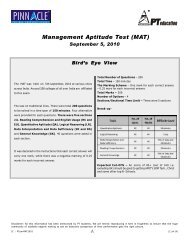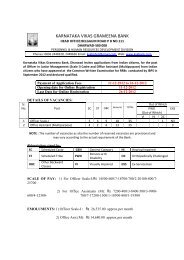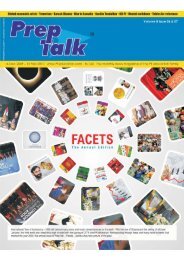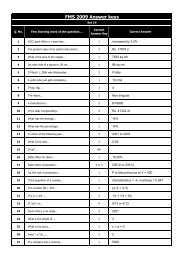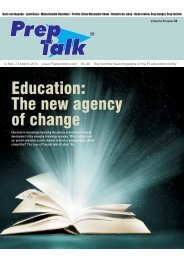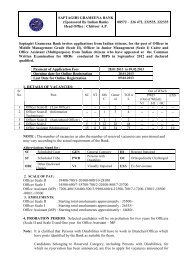Interview - Sample Questions & Suggested Answers
Interview - Sample Questions & Suggested Answers
Interview - Sample Questions & Suggested Answers
You also want an ePaper? Increase the reach of your titles
YUMPU automatically turns print PDFs into web optimized ePapers that Google loves.
<strong>Interview</strong> - <strong>Sample</strong> <strong>Questions</strong> &<br />
<strong>Suggested</strong> <strong>Answers</strong><br />
Mental fear of the unknown is often what produces the physical symptoms of<br />
nervousness. In addition to preparing yourself physically, you need to prepare yourself<br />
mentally. The best way to prepare mentally is to know what may be coming. Fear of the<br />
unknown can only exist when there is an unknown. Take the time to understand some of<br />
the “standards” when it comes to interviewing questions.<br />
The following are some of the most difficult questions you will face in the course of your<br />
job interviews. Some questions may seem rather simple on the surface—such as “Tell me<br />
about yourself”—but these questions can have a variety of answers. The more open<br />
ended the question, the wider the variation in the answers. Once you have become<br />
practiced in your interviewing skills, you will find that you can use almost any question<br />
as a launching pad for a particular topic or compelling story.<br />
Others are classic interview questions, such as “What is your greatest weakness?”<br />
<strong>Questions</strong> most people answer improperly. In this case, the standard textbook answer for<br />
the “greatest weakness” question is to provide a veiled positive such as: “I work too<br />
much. I just work and work and work.” Wrong. Either you are lying or, worse yet, you<br />
are telling the truth, in which case you define working too much as a weakness and really<br />
do not want to work much at all.<br />
The following answers are provided to give you a new perspective on how to answer<br />
tough interview questions. They are not there for you to lift from the page and insert into<br />
your next interview. They are provided for you to use as the basic structure for<br />
formulating your own answers. While the specifics of each reply may not apply to you,<br />
try to follow the basic structure of the answer from the perspective of the interviewer.<br />
Answer the questions behaviorally, with specific examples that show that clear evidence<br />
backs up what you are saying about yourself. Always provide information that shows you<br />
want to become the very best _____ for the company and that you have specifically<br />
prepared yourself to become exactly that. They want to be sold. They are waiting to be<br />
sold. Don’t disappoint them!<br />
Tell me about yourself.<br />
It seems like an easy interview question. It’s open ended. I can talk about whatever I want<br />
from the birth canal forward. Right?<br />
Wrong. What the hiring manager really wants is a quick, two- to three-minute snapshot of<br />
who you are and why you’re the best candidate for this position.<br />
So as you answer this question, talk about what you’ve done to prepare yourself to be the<br />
very best candidate for the position. Use an example or two to back it up. Then ask if they<br />
would like more details. If they do, keep giving them example after example of your
ackground and experience. Always point back to an example when you have the<br />
opportunity.<br />
“Tell me about yourself” does not mean tell me everything. Just tell me what makes you<br />
the best.<br />
Justify your decision to pursue the MBA programme?<br />
Don't tell the panel that you are looking for a "challenging job in a good firm with lots of<br />
money, status and glamour". Instead, you must convey to the interview panel that you<br />
have made a rational and informed decision about your career choice and your intended<br />
course of higher study. There are broadly four areas which your answer could touch upon<br />
:<br />
Career Objectives: You could talk about your career objectives and how the two<br />
year MBA programme will help you achieve them.<br />
Value Addition: Value addition will essentially be in two forms knowledge and skills.<br />
Background: This is where you connect your past to your future. If you are an engineer,<br />
try and say that the MBA course and your engineering degree will help you do your job<br />
better in the company that you will join. You should be able to convincingly justify how<br />
your engineering qualification will help.<br />
Opportunities and Rewards: You could also at this stage mention the opportunities that<br />
are opening up in organizations for management graduates. At this stage mentioning<br />
superior monetary rewards for management graduates may not be a bad idea.<br />
How do you spend your spare time?<br />
I have a good collection of books of different genre and enjoy reading. In addition, I love<br />
driving during late evenings or on rainy weekend afternoons. Also, for the last two years<br />
I've been volunteering at the local children's hospital on Saturday mornings.<br />
What are your weaknesses?<br />
I used to be somewhat disorganized, but eventually this got me into trouble when I<br />
missed an appointment I hadn't written down. It was clear that I had to learn how to be<br />
more organized. So, with the help of my senior colleague we worked out a system that I<br />
still use today. Not only do I stay on top of things, but I'm more efficient, too.<br />
The first thing you need to do prior to interviewing is assess yourself. This includes<br />
listing your strengths and weaknesses, your accomplishments and achievements,<br />
reviewing your strong and your weak subjects, and recording some of the key decisions<br />
you have made in your life.
You should then review your interests, the disappointments you've encountered, your<br />
work environment likes/dislikes, your business and personal values, your goals, needs,<br />
restrictions, and life style preferences. It would help if you're ready to practice answering<br />
the following potential questions<br />
What is your long-range objective? Make my job easy for me. Make me want to hire<br />
you.<br />
The key is to focus on your achievable objectives and what you are doing to reach those<br />
objectives.<br />
For example: “Within five years, I would like to become the very best accountant your<br />
company has on staff. I want to work toward becoming the expert that others rely upon.<br />
And in doing so, I feel I’ll be fully prepared to take on any greater responsibilities which<br />
might be presented in the long term. For example, here is what I’m presently doing to<br />
prepare myself . . .”<br />
Then go on to show by your examples what you are doing to reach your goals and<br />
objectives.<br />
Are you a team player?<br />
Almost everyone says yes to this question. But it is not just a yes/no question. You need<br />
to provide behavioral examples to back up your answer.<br />
A sample answer: “Yes, I’m very much a team player. In fact, I’ve had opportunities in<br />
my work, school and athletics to develop my skills as a team player. For example, on a<br />
recent project . . .”<br />
Emphasize teamwork behavioral examples and focus on your openness to diversity of<br />
backgrounds. Talk about the strength of the team above the individual. And note that this<br />
question may be used as a lead in to questions around how you handle conflict within a<br />
team, so be prepared.<br />
Have you ever had a conflict with a boss or professor? How was it resolved?<br />
Note that if you say no, most interviewers will keep drilling deeper to find a conflict. The<br />
key is how you behaviorally reacted to conflict and what you did to resolve it.<br />
For example: “Yes, I have had conflicts in the past. Never major ones, but there have<br />
been disagreements that needed to be resolved. I've found that when conflict occurs, it<br />
helps to fully understand the other person’s perspective, so I take time to listen to their<br />
point of view, then I seek to work out a collaborative solution. For example . . .”<br />
Focus your answer on the behavioral process for resolving the conflict and working<br />
collaboratively.
What is your greatest weakness?<br />
Most career books tell you to select a strength and present it as a weakness. Such as: “I<br />
work too much. I just work and work and work.” Wrong. First of all, using a strength and<br />
presenting it as a weakness is deceiving. Second, it misses the point of the question.<br />
You should select a weakness that you have been actively working to overcome. For<br />
example: “I have had trouble in the past with planning and prioritization. However, I’m<br />
now taking steps to correct this. I just started using a pocket planner . . .” then show them<br />
your planner and how you are using it.<br />
Talk about a true weakness and show what you are doing to overcome it.<br />
If I were to ask your professors to describe you, what would they say?<br />
This is a threat of reference check question. Do not wait for the interview to know the<br />
answer. Ask any prior bosses or professors in advance. And if they’re willing to provide a<br />
positive reference, ask them for a letter of recommendation.<br />
Then you can answer the question like this:<br />
“I believe she would say I'm a very energetic person, that I’m results oriented and one of<br />
the best people she has ever worked with. Actually, I know she would say that, because<br />
those are her very words. May I show you her letter of recommendation?”<br />
So be prepared in advance with your letters of recommendation.<br />
What qualities do you feel a successful manager should have?<br />
Focus on two words: leadership and vision.<br />
Here is a sample of how to respond: “The key quality in a successful manager should be<br />
leadership--the ability to be the visionary for the people who are working under them.<br />
The person who can set the course and direction for subordinates. The highest calling of a<br />
true leader is inspiring others to reach the highest of their abilities. I'd like to tell you<br />
about a person whom I consider to be a true leader . . .”<br />
Then give an example of someone who has touched your life and how their impact has<br />
helped in your personal development.
If you had to live your life over again, what one thing would you change?<br />
Focus on a key turning point in your life or missed opportunity. Yet also tie it forward to<br />
what you are doing to still seek to make that change.<br />
For example: “Although I’m overall very happy with where I’m at in my life, the one<br />
aspect I likely would have changed would be focusing earlier on my chosen career. I had<br />
a great internship this past year and look forward to more experience in the field. I simply<br />
wish I would have focused here earlier. For example, I learned on my recent<br />
internship…” …then provide examples.<br />
Stay focused on positive direction in your life and back it up with examples.<br />
In reviewing these responses, please remember that they are only to be viewed samples.<br />
Please do not rehearse them verbatim or adopt them as your own. They are meant to stir<br />
your creative juices and get you thinking about how to properly answer the broader range<br />
of questions that you will face.


